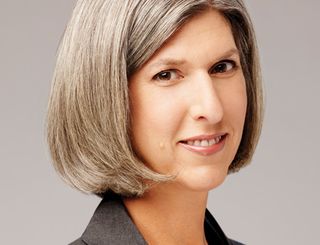The Consummate Programmer Of Screens of Every Size

Lauren Zalaznick produced some of the most highly regarded independent !lms of the 1990s. She also knew how to make a killer promo spot, having spent two years as the head of on-air promotions at VH1. So even though she lacked TV experience, it made sense when John Sykes, Zalaznick’s boss at VH1, offered in 1996 to make her VP of original programming and development. Sort of.
As she recalls, “The conversation went something like, ‘You’re really good at three-second things, and you’re really good at two-hour things, so if you averaged it out, you’d probably be pretty good at making TV shows. Do you want to do that?’”
She did. Zalaznick would help VH1 rede!ne itself through its programming before going on to engineer one of the biggest turnarounds in recent TV history at Bravo, then helm a suite of TV and digital brands for NBCUniversal. On Jan. 27 she will deliver NATPE’s opening keynote alongside Twitter executives Glenn Brown and Fred Graver. The next night, she’ll receive a Brandon Tartikoff Legacy Award.
Zalaznick, having departed NBCUniversal at the end of 2013 following a major executive shake-up, is currently plotting her next move. Zalaznick may be the only person to have ever run a television network after not watching TV for a 15-year period, through all of college, ending with the premiere of ER in 1994.
“Embarrassingly for a Tartikoff recipient, I have missed many, many, many, many, many Seinfeld and Friends references,” she says, adding, “When I started to commit a ton of time to media after college, it was the rise of the VCR and the rise of the video store.”
A love of film led to her career. “I’m a lucky person,” Zalaznick says as she describes how, after leaving school, she wrote on her typewriter to ask filmmaker Frank Perry, whom she did not know, for a job. He wrote back to offer a gig as his personal assistant on the movie Compromising Positions.
Zalaznick parlayed that job into steady, low-level work in mid-budget studio pictures, eventually establishing her own production company, doing TV commercials, music videos and promotional spots for networks such as MTV. She was on the set of Larry Clark’s Kids in 1994 when she got a call from VH1, which needed a new promotions head. Within two years she had transitioned to programming.
Broadcasting & Cable Newsletter
The smarter way to stay on top of broadcasting and cable industry. Sign up below
The first TV show she made was Pop-Up Video, a surprise success that helped VH1 define itself as something other than the bastard cousin of MTV, as did event programming she launched such as VH1 Divas Live and VH1 Fashion Awards.
After leaving the network in 2001, Zalaznick was offered two jobs and opted on the road less traveled: president of Trio, a Universal Television cable channel that didn’t actually exist yet.
“I took the Trio job because even at that time I recognized I was usually happier and thus more successful being the bigger !sh in the smaller pond,” Zalaznick says. She also liked that Trio was an early lab for experimentation in converging digital and television. But it didn’t last long. NBC merged with Universal in 2004. “I still didn’t know s--- from Shinola,” she concedes. “It didn’t occur to me what a merger is, where the person at the company being absorbed loses her or his job.”
Zalaznick would not learn until later that her head had been on the chopping block and was spared by Jeff Gaspin, her former VH1 boss. Gaspin put Zalaznick in charge of Bravo, a network that NBC had just acquired a year earlier. Zalaznick arrived six months after the launch of Queer Eye for the Straight Guy, which had delivered unprecedented ratings before tapering off.
Zalaznick formulated a two-pronged strategy: “Rewrap the box, and then fill the box with stuff that people wanted to see.” She launched Project Runway and when it didn’t succeed at !rst, she aired it 45 times over a holiday gap. The success that followed is the stuff of TV lore.
“She’s able to think very globally and with her eye on the future while never losing sight of the very speci!c details of the present day,” says Andy Cohen, Zalaznick’s programming chief at the time. He adds, “She’s kind of a rule-breaker in the best way.”
In 2007, Zalaznick was given responsibility for several NBCU properties, including Bravo, Oxygen and iVillage. com; then later, Fandango, Daily Candy, Style Network and Telemundo.
It’s the digital components of that portfolio that she talks most excitedly about now. She describes Bravo digital as “the leading cable network digital offering in the whole landscape.” She sounds almost reverent when describing the beauty of Fandango’s business model.
If Zalaznick knows exactly what her next move is, she’s not telling—but the direction she’s headed in is obvious.
“In a way, NBCUniversal is too successful to radically re-mantle the way we do business,” she says. Then she adds, “I’ve been increasingly drawn to the intersection of great content, audiences, technology and data—and I want to be at the nexus of those intersections, not on each corner.”
